Watch Jeremy Corbyn’s uplifting call upon peace workers worldwide to join hands and reimagine our world at the IPB World Peace Congress – October 15-17 in Barcelona.
Continue reading “Jeremy Corbyn – IPB World Peace Congress Greeting”
Watch Jeremy Corbyn’s uplifting call upon peace workers worldwide to join hands and reimagine our world at the IPB World Peace Congress – October 15-17 in Barcelona.
Continue reading “Jeremy Corbyn – IPB World Peace Congress Greeting”
Based on different reports (e.g. ICAN’s 2021 report, SIPRI Yearbook 2021, the research of the Bulletin of the Atomic Scientists, etc.), the IPB launched the brochure “Move The Money From Military To Social Purposes” in order to provide an overview of the use of nuclear weapons by the World Nuclear Forces. Although the brochure is intended to be informative, the data is used to emphasize the need of reallocating economic resources spent on nuclear weapons development and military to invest them in social
purposes.
To download the brochure click here.
You are currently viewing a placeholder content from YouTube. To access the actual content, click the button below. Please note that doing so will share data with third-party providers.
The world stands at a historically unique crossroads – either the abyss of nuclear, ecological, and social disaster or a common, just, demilitarized, and environmentally sustainable future. The social and environmental catastrophes reinforced by greed, racism, and sexism are undeniable. But we are not helpless – we can and are mobilising to restore health to our planet.
We are launching a campaign to support the basic costs of these young activists to travel to the World Peace Congress 2021 and to improve our technological capacities to include those who cannot afford to make the journey. While we cannot support travel costs for the entire IPB family, this is our way of making sure we can include the inspiring voices of youth peace activists and to reach a wider global audience.
Donations will go first to the travel and lodging costs for global south youth representatives, estimated to be CHF10,000. Additional funds raised beyond this will contribute to enhancing our technical capacities – technological equipment and personnel to operate and optimize a hybrid event platform enabling Global South participation via plenary speeches, workshops, cultural events, and interactive platform features. Holding a hybrid event will be key to bringing together a truly inclusive Congress.
Find more information and donate here.
Watch our final statement on the 2021 Global Days of Action on Military Spending (GDAMS).
Yet again we have witnessed a cycle of violence in the Middle East as war has broken out between Israel and Palestine. The hostilities are exacting an unforgiveable human price as the civilian populations were targeted and humanitarian relief to Gaza faces insurmountable obstacles. This disregard for the civilian populations means that we have witnessed crimes against humanity.
Continue reading “Israel and Palestine: From This War a New Peace Process Must Emerge”
”You may kill a terrorist with a weapon, but you may kill terrorism with education”
Malala Yousafzai, Nobel peace laureate
Women’s Regional Network, WRN, has developed a Statement of Concern on the withdrawal of US, NATO and other foreign troops from Afghanistan. They are concerned about the situation of Afghan women and their future. The Statement consists of seven most valuable points to be taken into consideration in the transition period.
Continue reading “Afghanistan: Women, withdrawal of troops and transition strategy”
The amount of military spending in the world is a political, social, ecological, economical and ethical scandal. It reveals the continued misplaced priorities of global leaders.
Despite the ongoing pandemic, environmental emergency, and growing inequality, military spending increased by 2.6%, from US$ 1.917 trillion in 2019 to $ 1.981 trillion – just shy of 2 trillion in 2020.
Continue reading “IPB Statement on the Release of SIPRI’s Military Expenditure Data for 2020”
To friend, colleague, teacher and estimated Arcadi Oliveres.
Arcadi Oliveres has dedicated his life to building a world free and emancipated from any kind of violence, devoting the maximum of his efforts to the promotion of human rights, social justice, aid for people development and construction of peace. In addition to these four major areas, Arcadi, economist by education, notably specialized in the two that were the closest to him, which are development and military economics. To these areas he devoted his greatest efforts.
Image: Reiner Braun (second from the left) and Sharan Burrow (third from the right) at the Seán MacBride Peace Prize Ceremony for Jeremy Corbyn.
Sharan Burrow is the General Secretary of the International Trade Union Confederation (ITUC). During her time at the head of ITUC, she has helped to foster relations between trade unions and the peace movement – bringing together themes of peace, justice, conversion, and the need for a peace dividend. IPB Executive Director Reiner Braun sat down for an interview with Sharan to discuss the interconnections between the trade union and peace movements.
Continue reading “Interview with Sharan Burrow, ITUC General Secretary”
The International Signature Campaign in Support of the Appeal of the
Hibakusha was launched in April 2016 in the name of prominent Hibakusha of Hiroshima and Nagasaki. Since its launch, the signature campaign has been supported by a broad range of prominent individuals and organizations, enjoying great support from people across the world. The collected signatures, total 11,843,549 (as of March 31, 2020,) making it one of the largest signature campaigns ever carried out in the world and a powerful popular force manifesting global demands for the complete elimination of nuclear weapons. The signatures have been submitted and
acknowledged by the U.N. and NPT PrepCom Chairs.
In addition to worldwide efforts, across Japan signature promotion committees have been established in each of Japan’s 47 prefectures, leading to the endorsement of the Appeal by 1263 mayors and governors. On the August 6-9 the 75th anniversary commemorations for the bombing of Hiroshima and Nagasaki, the “Peace Wave” of international joint actions by grassroots organizations will circle the globe with activities to press for the elimination of nuclear weapons with the Hibakusha Appeal signature campaign serving as the Peace Wave’s common action.
On March, 17th 2021, the Séan MacBride Peace Prize has formally been awarded to Terumi Tanaka, Convenor of the Promotion Committee of the Int. Hibakusha Appeal Signature Campaign. During this first online award ceremony featuring a warm welcome from IPB Co-President Lisa Clark and Rieko Asato from the IPB Board/Gensuikyo, moderation by IPB Ex. Director Reiner Braun and an expressive and extremely timely Laudation by IPB CO-President Philip Jennings, Terumi Tanaka and the Signature Campaign’s Leader Mitsuhiro Hayashi vividly illustrated the central importance the struggle against nuclear weapons still occupies in our world today – for the Hibakusha, for the Japanese people, for every world citizen.
They left the guests with the powerful message of pride for their achievements, determination on the steps ahead, but most of all: Hope for the future, a nuke-free future, to come.
Akira Okuma performing ‘Imagine’ in Japanese and as English singalong made this event a truly unique experience, uniting us if not in space but in spirit.
Our deepest thanks to all organizers, speakers, interpreters, technical support and guests from all over the world who made this ceremony special against all contemporary odds.
Have a look at the programme and some images of the Ceremony below, or watch the event on YouTube!
You are currently viewing a placeholder content from YouTube. To access the actual content, click the button below. Please note that doing so will share data with third-party providers.
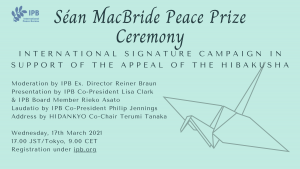
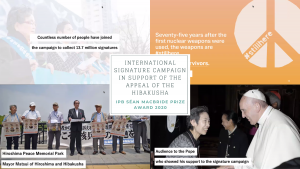
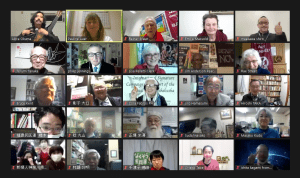
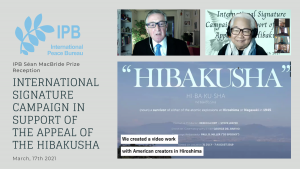
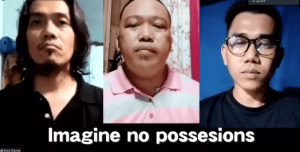
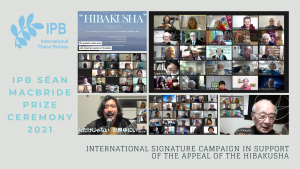
SéanMBride Prize Programme FINAL
You need to load content from reCAPTCHA to submit the form. Please note that doing so will share data with third-party providers.
More InformationYou are currently viewing a placeholder content from Turnstile. To access the actual content, click the button below. Please note that doing so will share data with third-party providers.
More InformationYou are currently viewing a placeholder content from Facebook. To access the actual content, click the button below. Please note that doing so will share data with third-party providers.
More InformationYou are currently viewing a placeholder content from Instagram. To access the actual content, click the button below. Please note that doing so will share data with third-party providers.
More InformationYou need to load content from Turnstile to submit the form. Please note that doing so will share data with third-party providers.
More InformationYou need to load content from hCaptcha to submit the form. Please note that doing so will share data with third-party providers.
More InformationYou need to load content from reCAPTCHA to submit the form. Please note that doing so will share data with third-party providers.
More InformationYou are currently viewing a placeholder content from Turnstile. To access the actual content, click the button below. Please note that doing so will share data with third-party providers.
More InformationYou are currently viewing a placeholder content from X. To access the actual content, click the button below. Please note that doing so will share data with third-party providers.
More Information